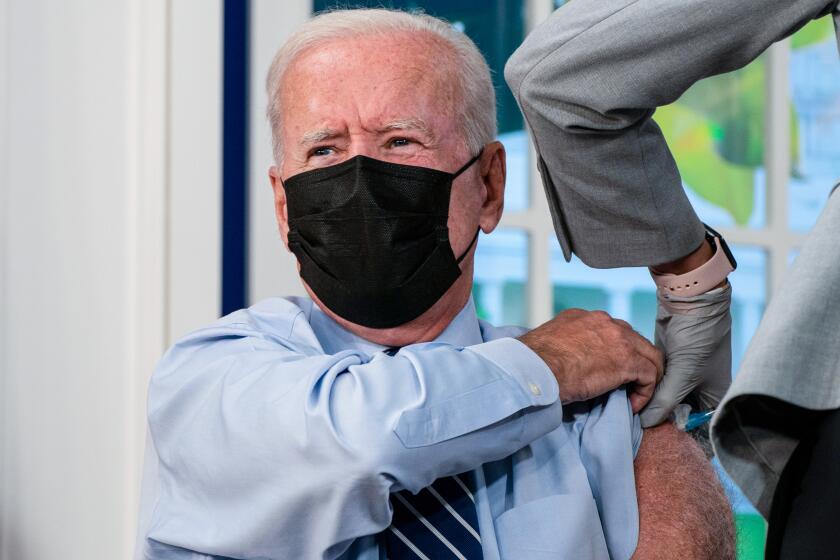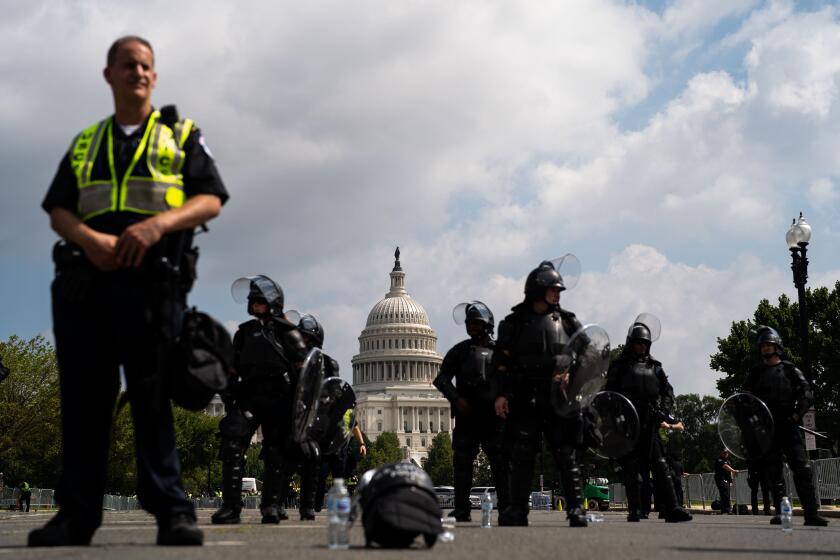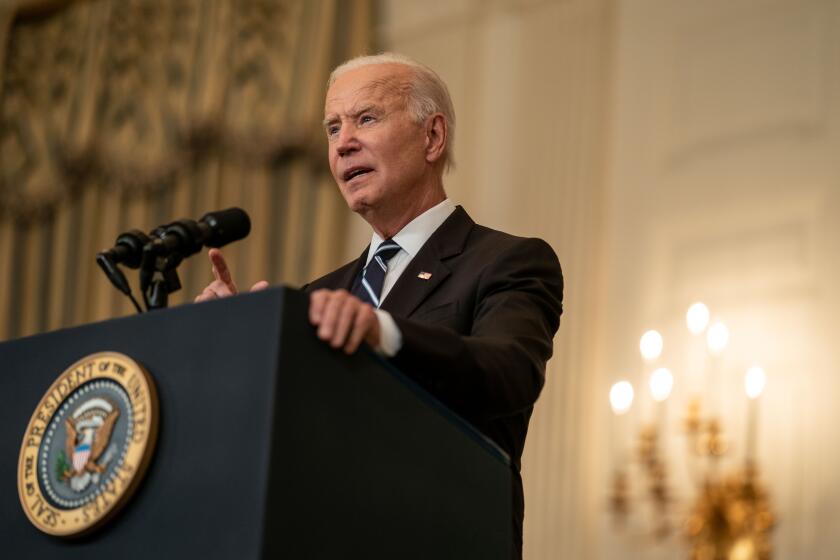Column: How our COVID-19 disaster grew directly out of our income inequality crisis

- Share via
With the nation’s death toll from COVID-19 now having surpassed 700,000, now is the time to reckon with the question of how this disaster came to pass.
Some answers can be found in the mechanisms of public health and politics: Health agencies didn’t move swiftly enough to address the mushrooming threat and spent months debating best practices — masks, school shutdowns, business closings, yes or no? Donald Trump and his fellow Republicans turned social distancing measures into partisan litmus tests. Charlatans promoted useless nostrums, diverting precious resources away from research into legitimately promising treatments.
No society...is immune from seeing its basic democratic values at risk whenever the majority of its citizens lose their sense of forward economic progress.
— Economist Benjamin M. Friedman
Make no mistake: America’s rate of more than 213 deaths per 100,000 population is shamefully worse than most of the world’s developed countries, according to the most recent accounting by Johns Hopkins University. The record is a reproach to a nation that can call upon the greatest wealth and most advanced technical knowledge on the planet.
To understand why that has happened, one has to delve deeper than the most evident bureaucratic failures and political malpractice. The root cause of our COVID failure is our increasing economic inequality.
Get the latest from Michael Hiltzik
Commentary on economics and more from a Pulitzer Prize winner.
You may occasionally receive promotional content from the Los Angeles Times.
The scandalously uneven and unjust distribution of America’s economic gains over the past half-century has affected society in countless ways, visible in our systems of politics, governance, education and housing.
When it comes to the pandemic, inequity has been manifested in what the indispensable Andy Slavitt, the former Medicare and Medicaid director under President Obama, described in a recent tweet as “denial of science, a health system marked by neglect, massive disparities between rich & poor and black & white, cruelty & bullying, [and] unmourned losses.”
It’s no secret that economic inequality causes a host of social pathologies. The “grave moral consequences” of stagnant growth and widening inequality were laid out in frightening detail by the economist Benjamin M. Friedman in a 2005 book and subsequent papers.
Friedman made the compelling case that a broad-based rising standard of living helps to sustain such positive social manifestations as “tolerance, openness of opportunity, generosity toward the disadvantaged, and commitment to democracy.”
When the opposite occurs — stagnant or declining living standards — “the outcome is retrenchment and rigidification, often with disastrous consequences.”
In that environment, Friedman observes, an instinct toward economic self-protection emerges. It is manifested in “intolerant, antidemocratic, and ungenerous behavior — racial and religious discrimination, antipathy toward immigrants, lack of generosity toward the poor.”
So far, not very many workers have quit their jobs over COVID-19 vaccine requirements. But the rules have encouraged thousands to get vaccinated.
There can be no doubt that America has been in the throes of economic inequality for its residents for decades.
In 1990, for instance, the nation’s total income — that is, gross domestic product — was $5.96 trillion, meaning that its average income, that is, GDP divided by population, was $23,880 and that of the average household of, say, a family of four was about $95,500.
The median income, however — the point at which half the households earned more and half earned less — was $54,620. The average was skewed by earnings at the top of the ladder.
In 2020, GDP was $20.94 trillion, averaging out to $254,203 for a four-person household. Obviously, the typical household didn’t collect that much. The median income was $79,900.
In other words, while the size of the U.S. economy has nearly quadrupled and the average economic share per person has gained about 2.6-fold, median household income has only risen by 46%. Much more wealth is flowing to the wealthy.
“No society,” Friedman wrote in 2009, “is immune from seeing its basic democratic values at risk whenever the majority of its citizens lose their sense of forward economic progress.”
That’s where we are today. The outcomes are evident everywhere — in heightened anti-immigrant fervor, racial and ethnic discrimination, hostility to government assistance programs.
A dismayingly large share of Americans — not necessarily a majority, but a vocal plurality — see the national economy as a battle between “us” and “them.”
That sense is exacerbated by the increasing political power of the very wealthy. That can be seen in their success in securing tax cuts that chiefly benefit them, impoverishing the IRS to the extent it can’t adequately audit their tax returns, and fighting regulations on industry such as those aimed at addressing global warming.
Talk of America’s polarization ignores the large majorities that favor abortion rights, COVID restrictions and gun control.
The last element needed to hamstring policy that benefits ordinary Americans is also in place: Politicians and media organizations devoted to stoking economic resentment for their own profit — among them Trump and the Republican mainstream, Fox News, Facebook — by persuading people to vote against their own interests.
This has played out in the pandemic in numerous ways. Slavitt pinpointed several, including the notion, promoted by Trump and others of his ilk, that the pandemic was merely an affliction of “the others” — among them the poor, immigrants living packed too closely together, inmates and nursing home patients, the obese and others with medical conditions.
“Many began to protest they knew no one who had died of COVID,” Slavitt tweeted. “An era of mocking disbelief & indifference assaulted families & medical workers.”
In previous national crises, the country was able to come together in a spirit of shared sacrifice because there was a national sense that the sacrifice would be shared. That was true through two World Wars and the Great Depression. But that spirit seemed to be gone during the Great Recession earlier in this century; the result was a recovery program that was stunted and inadequate, and that produced an economic recovery that was unusually limited and slow.
By the time the pandemic arrived, there was no national consensus for sacrifice at all. Slavitt observes that the nation’s complacency has defined our approach to many threats — school shootings, global warming, the lack of universal healthcare and poverty.
Refusal to participate in anti-pandemic measures is just another manifestation of our “practiced indifference,” he wrote.
Friedman’s observations about the rise of instinctual self-preservation in times of economic stagnation are perfectly borne out by our pandemic response.
President Biden’s COVID-19 vaccine mandate will save lives, and should withstand legal challenges.
The truculent refusal to don masks and get vaccinated, which are elements of a society-wide response, are couched in terms of individual “freedom” — never mind the threat that unvaccinated and unmasked individuals pose to everyone around them.
The defense of this selfish behavior has become febrile and hysterical, because it’s blessed by cynical and hypocritical public figures such as Trump and the anchor lineup on Fox News — most of whom have probably been vaccinated themselves, but on-air depict vaccination mandates as government tyranny.
(Fox’s company policy requires all employees to report their vaccination status to management and wear masks in indoor setting where social distancing isn’t possible.)
Advances and retractions in tolerant national policies closely track economic inclusiveness and exclusivity: Waves of anti-immigrant prejudice and violence such as immigration quotas and the rise of the Ku Klux Klan in periods of economic limits, the expansion of access to healthcare and education such as Medicare and Medicaid and the growth of public higher education in period of broad-based prosperity.
Only rarely has the narrowing of economic opportunity had as immediate and drastic an impact on public welfare as now.
The undermining of public health policies by the distorted notions of individual responsibility that keep Americans from accepting mask-wearing and vaccination against disease — not even true sacrifices, but mere inconveniences — will lead to the deaths of thousands more in coming months and long-term disabilities for untold more.
If there are better grounds for a dramatic recasting of the foundations of the American economy, it’s hard to conceive of them.
More to Read
Get the latest from Michael Hiltzik
Commentary on economics and more from a Pulitzer Prize winner.
You may occasionally receive promotional content from the Los Angeles Times.














